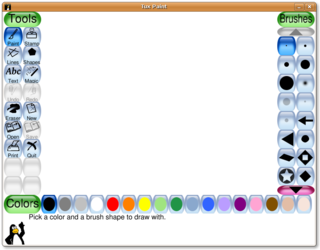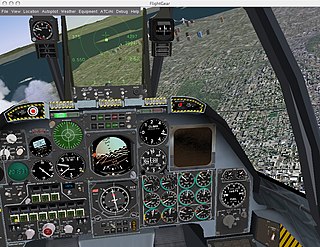
Quake is a first-person shooter game developed by id Software and published by GT Interactive. The first game in the Quake series, it was originally released for MS-DOS, Microsoft Windows, and Linux in 1996, followed by Mac OS and Sega Saturn in 1997 and Nintendo 64 in 1998.

Rise of the Triad: Dark War is a first-person shooter video game, developed and published by Apogee Software in 1995. The player can choose to play as one of five different characters, each bearing unique attributes such as speed and endurance. The game's story follows these five characters who have been sent to investigate a deadly cult, and soon become aware of a deadly plot to destroy a nearby city. A remake was designed by Interceptor Entertainment and released by Apogee Games in 2013. The shareware version of the game is titled Rise of the Triad: The HUNT Begins.

IceWM is a stacking window manager for the X Window System, originally written by Marko Maček. It was written from scratch in C++ and is released under the terms of the GNU Lesser General Public License. It is customizable, relatively lightweight in terms of memory and CPU usage, and comes with themes that allow it to imitate the GUI of Windows 95, Windows XP, Windows 7, OS/2, Motif, and other graphical user interfaces.

Tux Racer is a 2000 open-source winter sports racing video game starring the Linux mascot, Tux the penguin. It was originally developed by Jasmin Patry as a computer graphics project at the University of Waterloo. Later on, Patry and the newly founded Sunspire Studios, composed of several former students of the university, expanded it. In the game, the player controls Tux as he slides down a course of snow and ice collecting herrings.

Xandros, Inc. was a software company which sold Xandros Desktop, a Linux distribution. The name Xandros was derived from the X Window System and the Greek island of Andros. Xandros was founded in May 2001 by Linux Global Partners. The company was headquartered in New York City with its development office in Ottawa, Canada.

Frozen Bubble is a free software clone of Puzzle Bobble for a variety of home and mobile systems.

A netbook is a small and inexpensive laptop designed primarily as a means of accessing the Internet. Netbooks were sold from 2007 until around 2013, when the widespread advent of smartphones and tablets eclipsed their popularity.

SuperTux is a free and open-source 2D side scrolling platform video game inspired by Nintendo's Super Mario Bros. series. The player character is Tux, the official mascot of the Linux kernel.
Roxor Games, Inc. is a 25-person company based in Austin, Texas that develops video game software for the arcade and home markets. Founded in 2002, Roxor works with developers of open source software to deploy games on a Linux-based hardware platform in the arcade and on multiple home consoles. Although their most well known product, In The Groove, is proprietary software, the developers regularly contribute code back to the open source project StepMania upon which In The Groove is based.

Tux Paint is a free and open source raster graphics editor geared towards young children. The project was started in 2002 by Bill Kendrick who continues to maintain and improve it, with help from numerous volunteers. Tux Paint is seen by many as a free software alternative to Kid Pix, a similar proprietary educational software product.

Mathomatic is a free, portable, general-purpose computer algebra system (CAS) that can symbolically solve, simplify, combine and compare algebraic equations, and can perform complex number, modular, and polynomial arithmetic, along with standard arithmetic. It can perform symbolic calculus (derivative, extrema, Taylor series, and polynomial integration and Laplace transforms), numerical integration, and can handle all elementary algebra except logarithms. Trigonometric functions can be entered and manipulated using complex exponentials, with the GNU m4 preprocessor. Not currently implemented are general functions such as f(x), arbitrary-precision and interval arithmetic, as well as matrices.
Linux Game Publishing was a software company based in Nottingham in England. It ported, published and sold video games running on Linux operating systems. As well as porting games, LGP also sponsored the development of Grapple, a free software network library for games. As well as acting as a Linux game porter in of themselves, they also functioned as a publisher for other Linux game developers and porters. The company was dissolved on 3 May 2011.

An open-source video game, or simply an open-source game, is a video game whose source code is open-source. They are often freely distributable and sometimes cross-platform compatible.
Linux-based operating systems can be used for playing video games. Because few games natively support the Linux kernel, various software has been made to run Windows games, software, and programs, such as Wine, Cedega, DXVK, and Proton, and managers such as Lutris and PlayOnLinux. The Linux gaming community has a presence on the internet with users who attempt to run games that are not officially supported on Linux.

The ASUS Eee PC is a netbook computer line from Asus, and a part of the ASUS Eee product family. At the time of its introduction in late 2007, it was noted for its combination of a lightweight, Linux-based operating system, solid-state drive (SSD), and relatively low cost. Newer models added the options of Microsoft Windows operating system and rotating media hard disk drives (HDD), and initially retailed for up to 500 euros.

SuperTuxKart (STK) is a free and open-source kart racing game, distributed under the terms of the GNU General Public License, version 3. It features mascots of various open-source projects. SuperTuxKart is cross-platform, running on Linux, macOS, Windows, iOS (beta), Android systems and Nintendo Switch (homebrew).

Tux Typing is a free and open source typing tutor created especially for children. It features several different types of game play, with a variety of difficulty levels. It is designed to be fun and to improve words per minute speed of typists.

Asus EeeBox PC is a nettop computer line from ASUSTeK Computer Incorporated, and a part of the Asus Eee product family. First released on August 11, 2008, the Asus EeeBox PC series is marketed as a small, light, inexpensive and energy-efficient counterpart to the Asus Eee PC netbook / subnotebook laptop series. Its motherboard employs Splashtop technology called Express Gate by Asus.
















